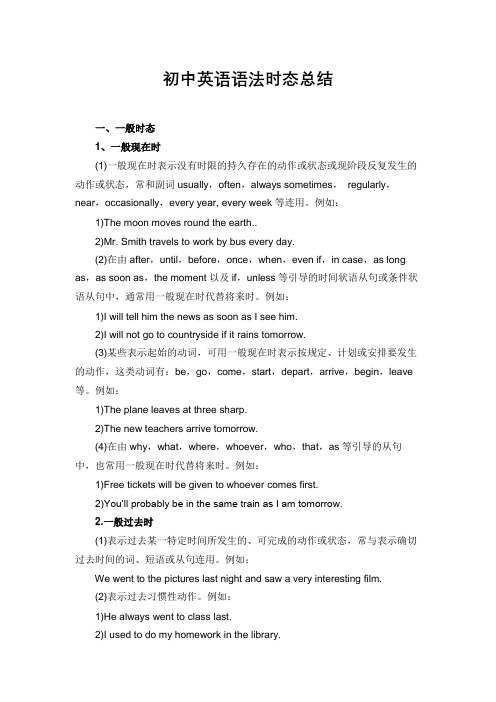初中英语时态总结一览表
- 格式:docx
- 大小:20.29 KB
- 文档页数:3

初中英语八大时态表格时态名称结构(以动词do为例)用法示例常见时间状语一般现在时do/doesI often play basketball.(表示经常或习惯性的动作)<br>He likes reading.(表示现在的状态、事实或真理)always, usually, often, sometimes, every day/week/month/year等一般过去时didI went to the park yesterday.(表示过去某个时间发生的动作或存在的状态)yesterday, last week/month/year, just now, a moment ago等一般将来时will/shall do(第一人称常用shall),be going to doI will go to Beijing next week.(表示将来某个时间要发生的动作或存在的状态)<br>He is going to study hard.(表示打算、计划做某事)tomorrow, nextweek/month/year, in + 一段时间等现在进行时am/is/are doingShe is reading a book now.(表示此时此刻正在进行的动作)now, at the moment, look, listen等提示词出现时过去进行时was/were doingI was doing my homework when he came in.(表示过去某个时刻正在进行的动作,常与一般过去时搭配使用)at this time yesterday, from 7 to 9 last night等现在完成时have/has doneI have already finished my homework.(表示过去发生的动作对现在造成的影响或结果)<br>He has lived here for ten years.(表示过去已经开始,持续到现在的动作或状态)already, yet, just, ever, never, for + 时间段, since + 时间点等过去完成时had doneWhen I got to the station, the train had already left.(表示在过去某个时间或动作之前已经发生或完成的动作,即“过去的过去”)by the end of last year, before + 一般过去时的句子等将来进行时will be doingI will be having a meeting at this time tomorrow.(表示将来某个时刻或时间段正在进行的动作)at this time tomorrow等。

一般现在时表示经常发生的动作或存在的状态主语+动词原形/动词第三人称单数形式She often goes to school by bike.一般过去时表示过去发生的动作或存在的状态主语+动词过去式He played football yesterday.一般将来时表示将要发生的动作或存在的状态主语+will/shall+动词原形We will have a party next week.现在进行时表示正在进行的动作主语+am/is/are+动词-ing 形式They are playing basketball now.过去进行时表示过去某一时刻正在进行的动作主语+was/were+动词-ing 形式She was reading a book when I camein.将来进行时表示将来某一时刻正在进行的动作主语+will/shall+be+动词-ing 形式They will be having a meeting at thistime tomorrow.现在完成时表示过去发生的动作对现在造成的影响或结果主语+have/has+过去分词I have already finished my homework.过去完成时表示过去某一时刻之前已经完成的动作主语+had+过去分词He had left before I arrived.将来完成时表示将来某一时刻之前已经完成的动作主语+will/shall+have+过去分词They will have finished the project bythe end of this month.现在完成进行时表示过去某一动作一直持续到现在主语+have/has+been+动词-ing 形式I have been learning English for tenyears.过去完成进行时表示过去某一动作一直持续到过去某一时刻主语+had+been+动词-ing 形式She had been working for eight hoursby the time I arrived.将来完成进行时表示将来某一动作一直持续到将来某一时刻主语+will/shall+have+been+动词-ing 形式They will have been working on theproject for two years by the end ofnext month.过去将来时表示过去某一时刻之后将要发生的动作主语+would/should+动词原形He said he would come back the nextday.过去将来进行时表示过去某一时刻之后将要进行的动作主语+would/should+be+动词-ing 形式She said she would be working on theproject at that time.过去将来完成时表示过去某一时刻之后将要完成的动作主语+would/should+have+过去分词He said he would have finished thework by the end of the week.。

初中英语时态总结表格时态 | 结构 | 功能 | 示例----------------------------------------------------------------一般现在时 | [主语 + 动词原形] | 表示习惯性、经常性行为 | He usually plays football after school.----------------------------------------------------------------一般过去时 | [主语 + 动词过去式] | 表示过去发生的事件 | I ate dinner at 7 o'clock yesterday.----------------------------------------------------------------一般将来时 | [主语 + will + 动词原形] | 表示将来要发生的事件 | She will visit her grandparents next week.----------------------------------------------------------------现在进行时 | [主语 + am/is/are + 现在分词] | 表示现在正在进行的动作 | They are watching a movie now.----------------------------------------------------------------过去进行时 | [主语 + was/were + 现在分词] | 表示过去某一时刻正在进行的动作 | He was studying when I called him.----------------------------------------------------------------将来进行时 | [主语 + will be + 现在分词] | 表示将来某一时刻正在进行的动作 | We will be eating dinner at 8 o'clock tomorrow. ----------------------------------------------------------------现在完成时 | [主语 + have/has + 过去分词] | 表示过去发生但与现在有关的动作 | I have finished my homework.----------------------------------------------------------------过去完成时 | [主语 + had + 过去分词] | 表示过去某一时刻之前已经完成的动作 | She had already left when I arrived.----------------------------------------------------------------将来完成时 | [主语 + will have + 过去分词] | 表示将来某一时刻之前已经完成的动作 | By this time next year, we will have graduated from high school.----------------------------------------------------------------情态动词 | [情态动词 + 动词原形] | 表示能力、意愿、推测等 | She can swim very well.----------------------------------------------------------------。

初中英语时态总结表时态是英语中非常重要的一部分,它表示了动作的时间。
在英语中,一共有12种时态。
下面是这12种时态的总结表。
一、一般现在时(Simple Present Tense)用于表示经常性、习惯性的动作,或者陈述客观真理。
构成:主语 + 动词原形(第三人称单数要加-s)例句:I eat breakfast every morning.(我每天早上吃早餐。
)He plays football on Saturdays.(他星期六踢足球。
)The Earth revolves around the sun.(地球绕太阳转。
)二、一般过去时(Simple Past Tense)用于表示过去发生的动作或状态。
构成:主语 + 动词过去式例句:I watched a movie last night.(昨晚我看了一部电影。
)She lived in London when she was young.(她年轻时住在伦敦。
)They went to the park yesterday.(他们昨天去了公园。
)三、一般将来时(Simple Future Tense)用于表示将来要发生的动作或状态。
构成:主语 + will + 动词原形例句:I will visit my grandparents next week.(下周我将去看望我的祖父母。
)She will study abroad after graduation.(她毕业后将出国留学。
)They will have a party on Friday.(他们将在星期五举行一个派对。
)四、现在进行时(Present Continuous Tense)用于表示现在正在进行的动作。
构成:主语 + am/is/are + 现在分词(-ing形式)例句:I am reading a book now.(我现在在读一本书。
)She is playing the piano at the moment.(她此刻正在弹钢琴。

初中英语语法时态总结一、一般时态1、一般现在时(1)一般现在时表示没有时限的持久存在的动作或状态或现阶段反复发生的动作或状态,常和副词usually,often,always sometimes,regularly,near,occasionally,every year, every week等连用。
例如:1)The moon moves round the earth..2)Mr. Smith travels to work by bus every day.(2)在由after,until,before,once,when,even if,in case,as long as,as soon as,the moment以及if,unless等引导的时间状语从句或条件状语从句中,通常用一般现在时代替将来时。
例如:1)I will tell him the news as soon as I see him.2)I will not go to countryside if it rains tomorrow.(3)某些表示起始的动词,可用一般现在时表示按规定、计划或安排要发生的动作,这类动词有:be,go,come,start,depart,arrive,begin,leave 等。
例如:1)The plane leaves at three sharp.2)The new teachers arrive tomorrow.(4)在由why,what,where,whoever,who,that,as等引导的从句中,也常用一般现在时代替将来时。
例如:1)Free tickets will be given to whoever comes first.2)You’ll probably be in the same train as I am tomorrow.2.一般过去时(1)表示过去某一特定时间所发生的、可完成的动作或状态,常与表示确切过去时间的词、短语或从句连用。

初中英语语法总结一览表语法项目构成用法一般现在时主语 +动词原形或者表示经常性的第三人称单数 -s / es 动作或状态一般过去时主语 +动词过去式表过去某个、段时间内动( did 或者 be—was/ were 作及状态主语 +be going to +动词原在将来某个时间或一般将来时形某段时要做的事will / shall + 动词原形象征词Every ?often ?always on 天季、节、年。
Ago / just now / In 1998week / yesterday 等tomorrow / afternext / tonight ?in 2010例句in 月、He goes to school every day.I often have lunch at home./last He wrote a letter yesterday.I was born in 1979.Are you going to read?He will come tomorrow.现在进行时主语 +be(am/is/are) + doing 表此时此刻正进行的动作或状态现在完成时主语 +have / has + 动词过去发生在过去影响在现在的分词现在完成进行时动作或状态等主语 +have/has been+ doing.过去进行时主语 +was / were +doing 表在过去某时间正在进行多用于复合句中的动作过去完成时主语 +had+动过去分词该动作发生在过去的过去多用于复合句中过去将来时主语 +would + 动词原形过去看来将要发生的动作多用宾语从句中或状态listen?look?nowTom is writing now.all the time?Don ’ tThey are lying on the bed.含糊的频率副词 ?already?just?never everHe has slept for two days.I have been teaching for 8 years.at this time yesterdayHe was reading at that timelast Sunday eveninglast Fridayby the time +过去时We had learnt 2000 wordswhen?after?before by the end of?last year.He said that heHe said that he would come here the nextthe next day .day .。
初中英语语法八大时态总结完整版一、一般现在时1.定义:表示经常性或习惯性的动作、状态或真理。
2.结构:主语+动词原形(+其他成分)。
3.例句:(1) I go to school every day.(2) He often plays basketball after school.(3) Water boils at 100 degrees Celsius.二、一般过去时1.定义:表示过去一些时间发生的动作或存在的状态。
2.结构:主语+动词的过去式(+其他成分)。
3.例句:(1) They visited their grandparents last weekend.(2) She lived in Beijing when she was young.(3) We studied English in middle school.三、一般将来时1.定义:表示将来一些时间将要发生的动作或存在的状态。
2. 结构:主语 + will + 动词原形(+ 其他成分)。
3.例句:(1) I will go to the park tomorrow.(3) We will have a party next week.四、现在进行时1.定义:表示现在正在进行的动作。
2. 结构:主语 + am/is/are + 动词-ing(+ 其他成分)。
3.例句:(1) She is reading a book right now.(2) They are playing soccer in the park.(3) We are having dinner at the moment.五、过去进行时1.定义:表示过去一些时间正在进行的动作。
2. 结构:主语 + was/were + 动词-ing(+ 其他成分)。
3.例句:(1) He was watching TV at 8 o'clock last night.(2) They were traveling in Europe during summer vacation.(3) We were studying when the phone rang.六、将来进行时1.定义:表示将来一些时间正在进行的动作。
初中英语语法⼋⼤时态总结(完整版)初中英语语法⼋⼤时态⼀.⼀般现在时1. 结构肯定句式:主语+动词原形/动词的第三⼈称单数+其他否定句式:主语+ (助动词)don't/doesn't +动词原形+其他⼀般疑问句式:Do/Does+主语+动词原形+其他简略回答:(肯)Yes,主语+do/does (否)No,主语+do/does not缩写形式: don't = do not does n't = does not例句:He often goes swimming in summer.I usually leave home for school at 7 every morning.1)表⽰经常的、习惯性的动作或存在的状态,常与表⽰频度的副词连⽤。
常⽤的频度副词有:always、often、usually、seldom、never、sometimes, every week (day, year, month …),once a week, on Su nday频度副词在句中通常放在⾏为动词之前,系动词、助动词之后。
例⼥⼝: He often goes swimming in summer.I usually leave home for school at 7 every morning.2)表⽰主语具备的性格、特征和能⼒等。
例如:All my family love football .My sister is always ready to help others .Ann writes good En glish but does not speak well.3)表⽰客观真理、客观存在、⾃然现象。
例如:The earth moves around the sun.Shan ghai lies in the east of China.4)表⽰按计划或安排好的,或将要发⽣的动作,可⽤⼀般现在时表将来。